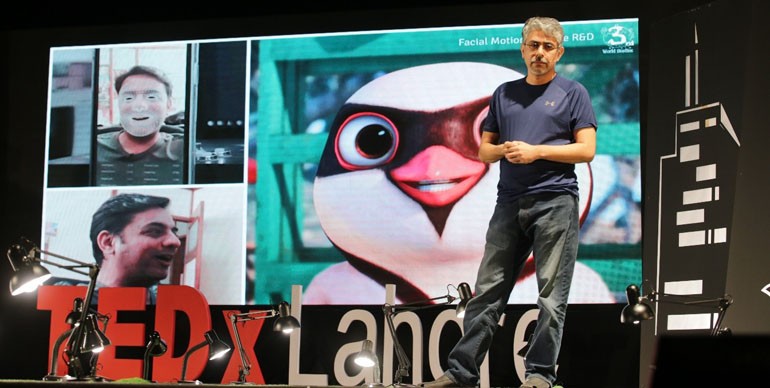
TEDx Lahore completes 10 years with an enlightening session at Ali Auditorium recently

Late October weather was a perfect occasion to interact with and learn from thinking people who came together at TEDx Lahore. This year, the theme of TEDx Lahore, which had turned 10, was ‘Imagined Futures.’
It was an exclusive gathering of 400 individuals that included students and young professionals from different fields such as public policy, education, arts, and law. As I entered Ali Auditorium’s premises, I saw an old CNIC board as a photo booth that had been set up by the Citizens’ Archive Pakistan (CAP). It attracted many who wanted their vintage-style, Polaroid images.
For the uninitiated, TED stands for Technology, Entertainment, and Design. It is regarded as one of the biggest conferences in the world, and has a pool of diversified speakers who share their ideas that have the potential to impact the world around us. For the past 32 years, it has grown and evolved. TEDx is an extension of it, where the letter "x" stands for TED events that are meant for the local community and which are organised by private groups and are licensed to share a TED-like experience.
"TEDx Lahore introduces to us innovative ideas, thinkers, dreamers, and policy makers every year. This year was no different," said Irteza Ubaid, TEDx Lahore’s young licensee and curator.
Co-Curator Areej Mehdi thanked "the people who’ve become part of our community either as volunteers, or speakers, or participants. These positive connections are what make TEDx Lahore special!"
Since the theme of TEDx Lahore was ‘Imagined Futures,’ the speakers expounded on plastic-free times, the importance of libraries and public spaces, and conserving the ecosystem for the generations to come.
World Without Waste (WWW), an initiative by WWF and Coca-Cola Pakistan, was introduced to the audience as promoting a plastic-free and sustainable world.
Speakers included Dr Usman T Malik, a medical doctor, a science fiction writer, and co-founder of the Salam Award for Imaginative Fiction, who is the first Pakistani to win the Bram Stoker Award; Dr Mehr Nigar, a scientist who said she was playing her part in improving plastic waste management; Uzair Zaheer Khan, the successful writer, producer, and director of the animated film, Allahyar and the Legend of Markhor and the Emmy-winning Burka Avengers; Akbar Nasir Khan, COO of Punjab Safe Cities Authority; Naheed Mooraj, an educationist, and founder of The Bee’s Knees, an initiative that provides alternatives to single-use plastic; and Shorba Noor, a Lahore-based singer and songwriter.
The session of speakers began with Dr Malik who revealed that he had become the first South Asian to win the British Fantasy Award for Best Novella of the Year in 2015. "Science fiction can be the simplest and most creative way to improve our education system because it is the literature of daring, speculation, endeavour and ideas," he said.
Dr Nigar offered "local solutions for local problems," especially with regard to plastics waste management in Pakistan. She said that by adopting waste segregation, plastic sorting, and organic material composting, we can create impact as individuals and also as a society. "In the absence of organised recycling options, this is the least that we can do."
Uzair Zaheer Khan, who specialised in character animation and visual effects from Vancouver Film School, before producing the animation films that sought to break gender and social stereotypes, said: "Animation is a powerful tool against bigotry, intolerance, and everything that’s wrong with the world."
Khan is also credited for making Pakistan’s first gaming software.
Dr Akbar Nisar Khan talked about safe, sustainable cities that should employ latest tools of technology for public safety and at the same time not overlook the people’s fundamental right to privacy.
Dr Anis ur Rehman is a recipient of the WWF Living Planet Award (2013). His achievements in conservation include the Himalayan Brown Bear Project, establishing the Deosai National Park and supporting the Margalla Hills National Park. At TEDx Lahore, he said, "If your kids want to see these parrots the next time, they should see them in their natural habitat rather than in cages!"
Shehzad Noor (alias Shorba Noor) the singer-songwriter of the indie band Poor Rich Boy, before he went independent and released his solo album, performed a track. Sharing his views, he said that he "want people to listen to our children and not dismiss their thoughts, hopes and dreams."
There was a special screening of the five-minute documentary, titled Rise, which was followed by a speech by its director Amna Usman, who also called herself a development practitioner. "I was given the opportunity to present my film about intimate relationship abuse, at the TEDx Lahore. I think it;s a great example to set in our society in terms of having a healthy discourse on sensitive topics."
The event was hosted by the lively Sophiya Anjum aka RJ Sophie. There were two networking breaks during the event, when the attendants had the chance to engage and network with each other.